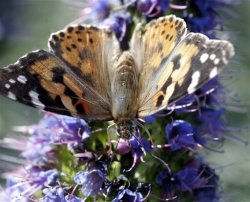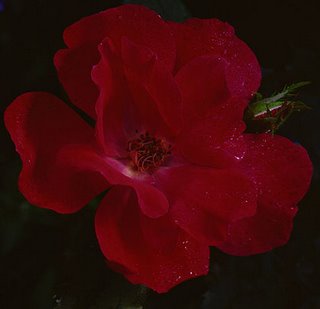Wednesday, May 17, 2006
Alligators Are Nothing To Tangle With
El Salvador Isn't Waking Up And Smelling The Coffee
With the greatest population density and smallest land size in Central America, El Salvador was long ago cleared of virtually all its native forest. Coffee farms, where bourbon variety coffee trees flourish under a thick shade canopy, provide 75 percent of El Salvador's remaining forest cover.Tropical forests that house El Salvador's famed coffee plantations and provide habitat for migrating birds are being depleted at an alarming rate, scientists warned on Tuesday.
Between 2001 and 2004, the country lost 21,025 hectares of forest-covered coffee farms, Mario Acosta, president of El Salvador's Foundation for Coffee Research (Procafe), said. El Salvador last year planted around 161,000 hectares of coffee, the vast majority of it grown on wooded plantations.
"Just in the period between 2001 and 2004, we lost 21,025 hectares with the accompanying environmental degradation, with the problems this means for watersheds and all the problems of unemployment in the countryside," Acosta told reporters at the opening of a regional conference on the role of the coffee industry in the environment.El Salvador: Coffee, US Library of Congress
Coffee Could Save El Salvador's Wildlife
United States Agency For International Development: El Salvador
China's Water Pollution Increasing
China has admitted that measures to tackle "serious" water pollution in the southern booming province of Guangdong are not working, state media reported on Wednesday.
Water quality in both coastal waters and inland estuaries remained poor, the China Daily said, citing Chinese experts.
The drainage of land pollutants to the sea was a key reason for the poor sea quality and poor ecological environment, the China Daily quoted Zhong Jianqiang, an environmental researcher, as saying
Cork Screwed?


Telling someone to put a 'stopper in it' won't have the same effect with plastic twist off caps.
If the Mediterranean cork oak forests are jeopardized, experts estimate that it could result in the loss of 62,500 jobs as well as a habitat loved by the endangered Iberian lynx, the Barbary deer, the black vulture and the imperial Iberian eagle.Up to three quarters of the unique cork oak forests of the Mediterranean could be lost within 10 years because of the increasing popularity of the screw-top wine bottle.
The move away from traditional stoppers made of cork threatens the survival of one of Europe's most important wildlife habitats, according to a study by the conservation group WWF.
If the trend for plastic stoppers and screw tops continues, then just 5 per cent of wine bottles sold in Britain in 2015 could be using corks, the report says.
Portuguese oak forests
World's Largest Cork Tree?
Cork Masters
African Glaciers To Disappear Within 20 Years?

A recent survey shows that the ice field straddling the border between Uganda and the Democratic Republic of Congo now covers less than a single square kilometre. A century ago, it was roughly seven times this size.The Elena glacier is retreating by between 10 and 15 metres each year, says Richard Taylor of University College London, who led the survey. The two images show the extent of the retreat over just 30 months.
Read the full article at Nature.
Harps On The Beaches Becoming Common Sight

An increasing number of young harp seals are straying from their northern breeding grounds and showing up on U.S. beaches, biologists say. Federal researchers say 297 harp seals were reported on beaches from Virginia to Maine last year, almost double the 152 reported in 1995.
The booming arctic harp seal population in Canada, spurred by a hunting ban, and dwindling food sources such as cod are among the reasons being cited.
China Starts "Ride A Bicycle To Work" Day

Beijeng has instituted a "no car" work day to reduce air pollution from automobile emissions.
Environmental officials in Beijing have asked residents to stop driving their cars to work one day a month in an effort to clean up the capital's stifling air pollution and ease traffic jams.
More than 200,000 drivers in up to 100 Beijing auto clubs have agreed to comply with the voluntary request, the Beijing
Environmental Protection Bureau said in a report posted on its website.The campaign to restrict car driving is modeled on a similar program initiated by 34 cities in France, the report said. The effort in Beijing is being made in coordination with a "blue sky day" campaign launched in 1998 in an effort to increase the number of days with good or fair air quality in the years running up to the Beijing 2008 Olympic Games.
Between the beginning of the year and mid-April, the city reported 56 "blue sky days," 16 fewer than the same period in 2005.
What's Your Ecological Footprint?

Have you noticed the televison commercials asking Europeans: "What's your ecological footprint" and their dazed expressions? On Central Florida Yards & Neighborhoods website's Enviromental page, you can find out what your ecological footprint is with cool calculators under Environmental Awareness.
These can help you determine the environmental impact of your activities. If you cannot eliminate or reduce the cause of the pollution, carbon offset services will provide affordable options to neutralize your carbon emissions. Besides ecological footprint calculators, also: calculators for commuting costs, building energy efficiency, solar water heating savings, food chemicals, ...
California Butterfly Species Hits 40-Year Low

One of the world's two largest butterfly data bases showing disturbing trend of reduced butterfly populations.
The number of butterflies migrating through the state has fallen to a nearly 40-year low as populations already hurt by habitat loss and climate change encountered a cold, wet spring, researchers said.
"Some of them were already in decline, but this weather really added insult to injury, kicking them when they were down," said Arthur Shapiro, an entomologist with the University of California, Davis.
Read more about what species are disappearing and why.
United Flight 93 Gets Honorary Rose

Non-profit organization Rose Garden has named a new yellow rose in honor of the passengers and crew of United Airlines flight 93, which crashed Sept. 11, 2001. Named Forty Heroes, the rose was hybridized by Ping Lim of Bailey Nurseries in St. Paul, Minn. It will be available to garden centers in 2008. Rose Garden is dedicated to creating Remember Me rose gardens in New York, Washington, D.C., and Pennsylvania to honor Americans who died during the Sept. 11 terrorist attacks. Forty Heroes is the fourth rose introduced by Rose Garden, following Firefighter, Soaring Spirits and We Salute You.
Japan vs China In The War Of The Flowers

From 1455 to 1487 Britain had the War of the Roses between the House of York and the House of Lancaster. Today, Japan and China are waging the War of the Carnations.
Japanese breeders assert that their precious strains are being grown illegally by Chinese farmers in a grand-scale intellectual property theft tantamount to DVD piracy or fake Gucci handbags.
Japanese Can't Play Chopsticks Any More

Preventing Chinese forests from being taken out affects Japanese take-out.
A restriction that the Chinese government has placed on the production of disposable wooden chopsticks to protect forests is beginning to affect Japanese box lunch companies, restaurants and pubs, industry sources said.
Sri Lanka's water still plagued by tsunami
Nation's Toughest Eminent Domain Law enacted in Florida
The Orlando Business Journal cited that the law requires local governments who acquire property through condemnation to offer to sell the land back to the previous owned if the land is no longer needed by the government entity itself. If the previous owner chooses to not buy it back, then the government has to wait 10 years before it can sell it through a competitive bidding process.
Science in the Garden

I enjoyed reading this week's New York Times' editorial regarding the New York Botanical Garden merging with scientific interests. Will universities and botanical gardens around the world find symbionic common ground?
Read more about the dynamics of horticulture and science.Twenty years ago, the future of the botanical garden was anybody's guess. It could have settled into being a pleasant afternoon outing, a slightly dowdy botanical experience. Instead, it has become what no one quite expected — one of the leading institutions in plant science — and it has done so in a way that has only enhanced the public's enjoyment. Seeing the science behind the garden makes the rest of the garden, the living collections we know so well, seem all the more remarkable.
But the dynamic of scientific research at the botanical garden will change with the official opening tomorrow of the Pfizer
Plant Research Laboratory, which will house programs in molecular systematics and genomics.
British Farmers Facing Extinction With Skylarks
"The decline in the agricultural workforce has been just as dramatic as the decline of skylarks," Soil Association policy director Peter Melchett told a news conference, referring to the British bird whose population has fallen sharply
Tomato Flavor Restores Rose Fragrance

It's easier to stop and smell the roses now, you just have to thank tomatoes and Gators.
Tired of big, colourful roses that hardly smell at all, flower researchers at the University of Florida/IFAS have found the genes to bring back that old-fashioned rose scent that has been accidentally bred out.
Their luck came unexpectedly from the tomato, where they were decoding the genes that give a tomato flavour. A flavour gene in the tomato turns out to be the scent gene in the rose. Now they're hoping tomato genes will make a rose by any name smell as sweet as before.
They say, they may even learn how to make a petunia smell rosy."The old-fashioned ones really did have a nice smell. Breeders looked for bigger flowers, showier flowers -- and they let the scent go by the wayside," says Denise Tieman, a flower scientist at the university's horticulture department.
Monday, May 15, 2006
Humans One Of The Vices To Sloth?

David Steadman, University of Florida researcher is quoted in LiveScience as believing humans were the reason that led the giant sloth to extinction. Steadman thinks that the encroaching boreal forest may have been the final last straw for large mammals in the North. What about the Ice Age?
In 2000, bones of the largest giant sloth was found by an University of Florida geology student in 1986 near Gainesville."There are so many things going on, and to me it's illogical to think that warming up and getting rid of ice sheets at 40 degrees latitude is a bad thing for large mammals," Steadman said. "They went through 20 glacial cycles in the last million years, and got through every one except for the last one. It has a
certain odor to it, and that odor is of humans."
"Weighing more than five tons and able to reach as high as 17 feet, the 2.2 million-year-old prehistoric creature was larger than today's African bull elephants, said UF paleontologist David Webb."Native to South America, Thomas Jefferson was also fascinated by sloth bones that were brought to the White House, commanding Lewis and Clark to "keep an eye out for ground sloths," David Webb said. "He was hoping they would find some living in the Western range."
Back To My Passions

After a hectic week full of meetings, back to working in my garden and blogging. Received for Mother's Day some of the newest sensations on the garden front, Home Run Roses, produced by Weeks Roses. They look wonderfully elegant in my yard. Added a king's mantle thunbergia erecta, ajuga, asiatic lilies, blue salvias to the front cottage garden, burgandy amaranthus to the woodland garden, and more azaleas under the oak tree. Now, lets hope the rains come.
Sunday, May 07, 2006
Florida Coral Species Threatened By Human Activities


Your lifestyle and landscape maintenance practices could be affecting Florida's coastal elkhorn and staghorn corals. These two coral species have now earned a place on the federal threatened list because of the last two decades of weather disasters, more water tourism activities, and increased algae from land-based nutrients, contaminants, and sediments from stormwater runoff and sewer outflows.
Pesticides Found In Snow In U.S. Mountain Ranges
Carcinogenic Pesticides Found In Second Hand Smoke
Wednesday, May 03, 2006
South Carolina County Fined For Stormwater Pollution
The county started a storm-water management program six years ago, but didn’t set up systems to prevent and monitor pollution, said officials with the state Department of Health and Environmental Control.
Tuesday, May 02, 2006
Insects Worth Their Weight In Money
Just In Time For National Water Crisis
Irrigation Association Promotes Healthier Lawns
The association offers
APHIS Confirms Gladiolus Rust In Florida
Source: GMPRO
AARS Names 2007 Rose Winners

AARS names 2007 rose winners All-America Rose Selections named its 2007 selections: Rainbow Knock Out, Moondance and Strike It Rich. Rainbow Knock Out from Conard-Pyle Co. is said to be even more floriferous and disease resistant than its parent, 2000 AARS winner Knock Out. Flowers are deep coral-pink with yellow centers and fade to light coral. Moondance is a floribunda from Jackson & Perkins with creamy-white flowers contrasted by glossy, dark-green foliage. Strike It Rich from Weeks Roses is a grandiflora with deep, golden-yellow flowers swirled with ruby red and a strong, spicy fragrance.
Source: GMPRO
Scientists Verify P. Ramorum In Forests
Source: GMPRO
Monday, May 01, 2006
Pesticides Affect Body Anatomy
Thanks and a hat tip to John.
"Do Bee Do Bee Do" Becoming A Plea

Sunday's Orlando Sentinel article by Tom MacCubbin talks about the dilemma of losing our non-native honey bees reducing pollination in our groves, farms, garden beds. Seems that Britain is seeing the same problem with their honey bees. You can help by creating your own attractive bee garden.